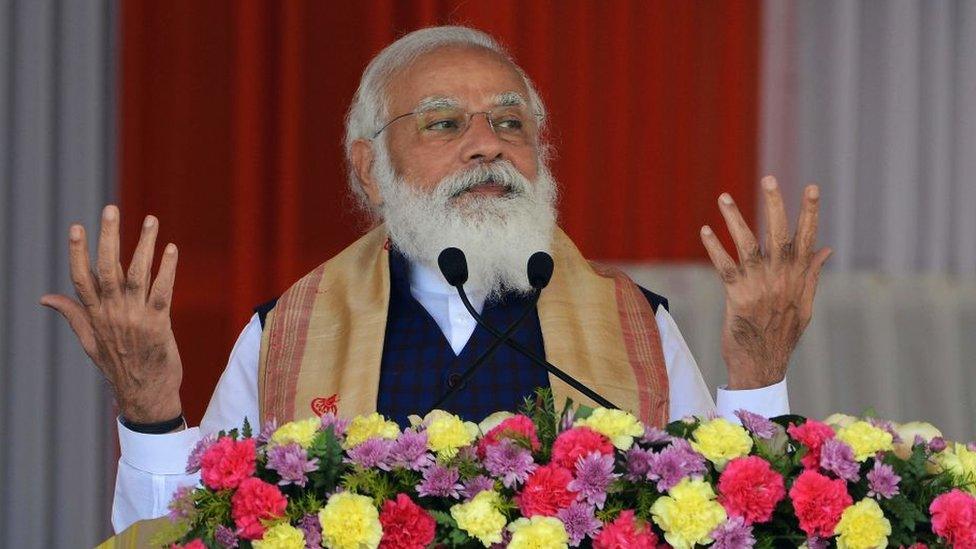India coronavirus: Tracing a family’s journey to save a life
- Published

Anoop Saxena, 59, was one of hundreds of thousands of Indians who fell sick with Covid at the end of April.
And like so many, the father from Ghaziabad city in northern India became so sick he needed to be treated in a hospital.
But India's hospitals have been overwhelmed, and beds and oxygen were all in short supply at the start of May - despite officials in Uttar Pradesh state, where Ghaziabad is located, continuing to insist there was no shortage either.
What followed over the next few days was just one example of a family's desperate search for help, wherever they could find it. There are many thousands more across India, just like this.
Here, we have recreated the Saxena family's battle.

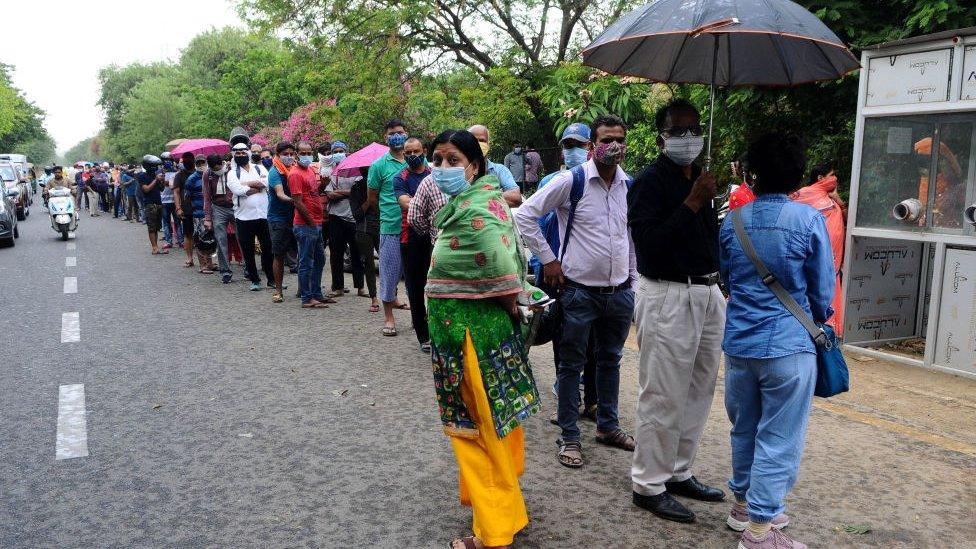
No test available
Anoop has high fever on 29 April and the doctor asks him to get tested for Covid-19. The family tries to book a slot for home collection but the labs refuse, saying they don't have the manpower to provide the service.
The family takes him to a public hospital. The queue is long, and Anoop's son Tushar wishes they could push ahead. But everyone in front of them is so sick.
Two hours later, when Anoop faints in the line, they decide to bring him home.

10am: Struggle to breathe

Anoop wakes on Saturday morning and tells his family that he is having difficulty breathing. The family gets a nebuliser - a small medical device for delivering a fine spray of a drug to patients - to help clear his airway.
It helps briefly but his oxygen levels continue to drop. It's 10am, and the doctor advises Anoop needs to be admitted to a hospital. The family tries to arrange an ambulance but none is available and they don't own a car. They ask a cousin, who lives in the neighbouring district of Hapur, to bring his car to Ghaziabad - a journey of 27km (17 miles).
The cousin arrives at Anoop's home in Akash Nagar at 2pm, but there is no sign of a hospital bed. It's now 4pm, they decide to take him to Gurdwara (Sikh temple) Sri Guru Singh Sabha where he is given oxygen from a cylinder. The family thanks the temple for running the free service for struggling families.

7:30pm: Search for hospital bed

His oxygen level becomes stable at the gurdwara but volunteers suggest that he should be taken to a hospital as they can't keep him there indefinitely. Tushar begs them to keep his father at the temple, but knows in his heart he must find a hospital bed.
The family takes him to state-run MMG hospital. After spending an hour, they realise that he won't get a bed anytime soon.

8pm: Search for oxygen

It's 8pm, the family is still at the hospital. Tushar calls his brother, who is at home, and tells him to go to the oxygen plant in the Lal Kuan area to look for a cylinder.
His brother joins a long queue at the plant, deciding to wait for his turn. Tushar is calling his brother every few minutes. He knows not finding an oxygen cylinder or a hospital bed will mean not surviving the night.

8:30pm: Giving up on hospital

Tushar brings his father home. He goes out to buy 25 small oxygen cans to help Anoop breathe. These cans give him small doses of oxygen at regular intervals but can't provide continuous supply. Each can costs 2,500 rupees [$34; £24]. They usually go for less than 1,000 rupees. This a big sum for the middle-class family like the Saxenas, but they have no choice.
Tushar tries to keep his father stable with the cans, while waiting for his brother to return with a oxygen cylinder.
At 1am, his brother returns without a cylinder because the plant closed before his turn could come. They continue to use the cans and Anoop slowly stabilises.

10am: Search for a bed resumes

The doctor again advises that he needs to be in a hospital. The family drives him to Gargi Hospital, which is the closest healthcare facility from their home.
A staff member tells them to try another hospital as they are no beds here.


The family then takes him to Sarvodya Hospital but again, there are no beds free. Meanwhile, Anoop is struggling to breathe and just wants to go home.
But the family are not giving up.


It's 12:05, and they are now at Santosh Hospital - the third medical facility they've tried this morning - and they are told to wait outside the hospital. The hospital gates are surrounded by security guards, making the family feel like they are outside a jail.
They wait for for 10 minutes and decide to try another hospital.
Tushar is starting to wonder at which hospital his father will take his last breath. But when his mother rings, he assures her they have found a bed, and everything is going to be okay.


They arrive at the fourth hospital at 12:30pm. The guard outside tells them to wait and see if someone is discharged, or dies. Tushar can't believe his father getting a bed relies on someone else's death.
Meanwhile, the little oxygen cans are no longer helping and Anoop is again gasping for air.

2pm: Temple offers relief

Anoop's condition is deteriorating further and the family decides to not waste anymore time and take him back to the gurdwara - the only place which has offered help so far. His oxygen level starts to improve after he is connected to a cylinder.

3pm: Search for oxygen continues
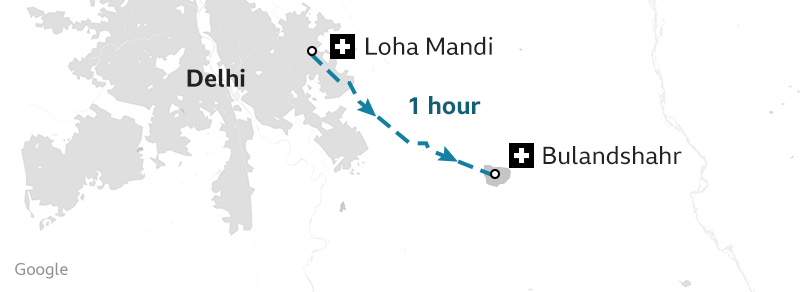
While Tushar was taking his father from one hospital to another hospital, he asked his brother to go to buy a cylinder locally, but the queues are too long.
Someone tells him that a plant in the nearby district of Bulandshahr - an hour away - was selling oxygen cylinder. But by the time Tushar's brother gets there, it had closed.
Tushar's brother comes back to Ghaziabad and buys a small five litre cylinder on the black market.

5.30pm: The final drive
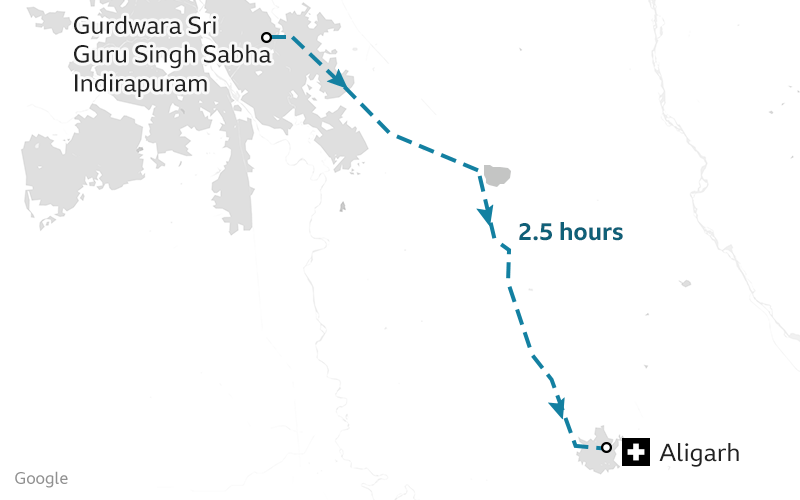
It's almost eight hours since the doctor told him to find help. But Anoop is still at the gurdwara. Meanwhile, his daughter, who lives in Aligarh city some 120kms (75 miles) away, finds a bed in a private hospital and tells the family to bring him there.
They begin the drive at about 6pm with Anoop connected to the small oxygen cylinder, arriving at the hospital at 8:30pm and he is immediately rushed into intensive care. The doctor there tells them that Anoop is critical and his chances of survival are slim.

4am: Losing the fight
After an eight hour wait, praying for a miracle, the doctor tells the family Anoop's condition is deteriorating. Tushar wonders if they could have done more.
Six hours later, at 10am, the doctor tells the family to say their final goodbyes. Anoop dies an hour later, at 11am.
Tushar hopes no one else will ever have to watch their parent struggle for breath like a fish out of water; he thinks about how it was the system which killed his father, not Covid.
But the family doesn't even get time to grieve as Anoop's wife's condition starts deteriorating. They head back home to Ghaziabad.
Route maps by Paul Sargeant, Lilly Huynh, Gerry Fletcher and Joy Roxas.

Life in India's capital has changed beyond recognition under a deadly second wave of Covid-19 infections
Related topics
- Published5 May 2021
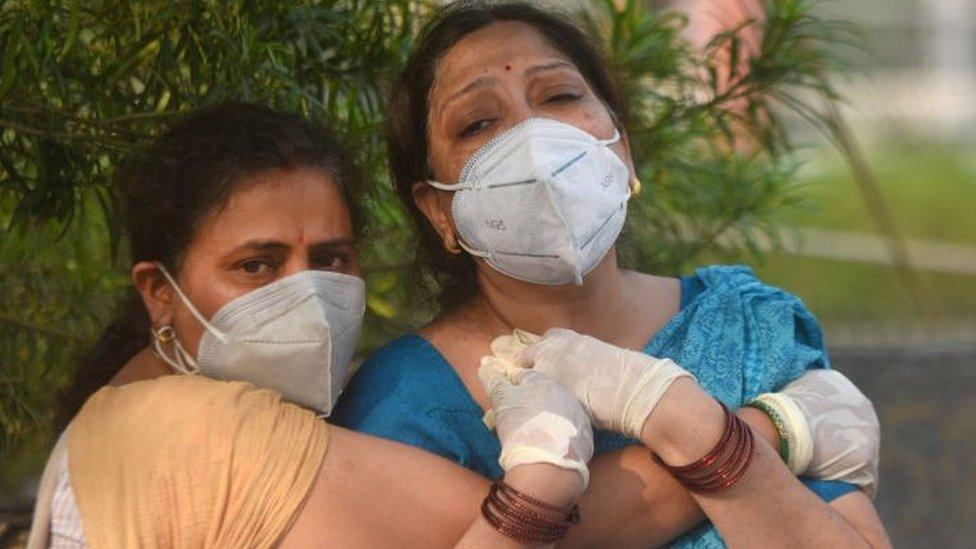
- Published11 May 2021
- Published8 May 2021
